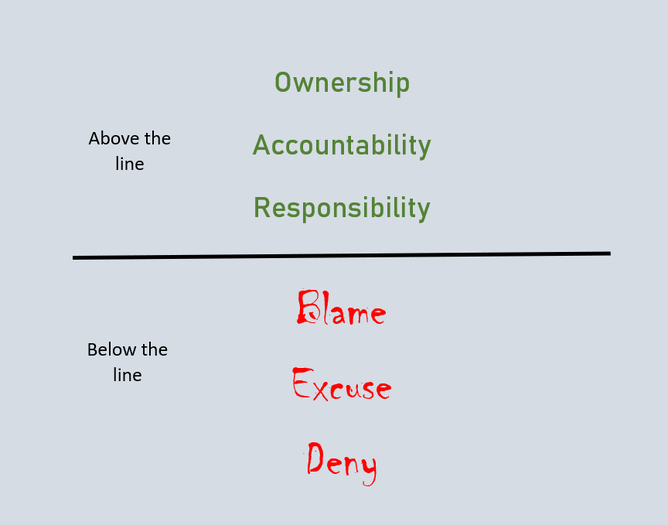The answer is surprisingly straightforward:
>> An excuse is offered by someone trying to be excused from a bad thing
>> A reason is offered by someone trying to help others understand why a bad thing happened but will ultimately let themselves be held accountable for the bad thing
The distinction comes from the OAR//BED framework – a method for discerning whether someone’s behaviour is “above the line” or below it (this also works for reflecting on your own behaviour).
When someone is operating 'below the line' they opt out of choosing their response. Eg; “the reason I’m behaving like this is because you’re behaving like that.” This 'you started it' or 'it’s not my fault' stance is reactive and perpetuates poor behaviour. This reactive stance can be summarised by “I’m not in control of what happens to me, and I’m also not in control of my response.”
In contrast, when someone is operating 'above the line' they are doing whatever they can to choose their response. Responses will be “I will” and “I can” regardless of what they said and did. An above the line response comes from a frame of mind that insists on upholding free choice; that your behaviour isn’t determined from the outside. This frame of mind is what Stephen Covey described as “being proactive” (The 7 Habits of Highly Effective People).
People who are living below the line will offer excuses to their behaviour hoping to be excused from it. People who are living above the line might offer reasons why something happened (we all want to be understood) but will ultimately let themselves be held accountable to the outcome.
People who live below the line don’t just offer excuses however… the OAR/BED model informs us that sometime people will blame others for a bad thing, at other times they may also deny the bad thing is a bad thing. As an example, being short with a work colleague might sound like;
Blame – She has been short with me all morning, she wore me down
Excuse – I just have a lot on at the moment
Denial – He’s over-reacting, it wasn’t that bad
And likewise, someone who is living above the line will exhibit a range of behaviour. For the same issue – ‘how I speak to people’ – you might hear them say;
Ownership –Speaking well is important to me, I want to be known as a patient person
Accountability – I will admit when I have spoken out of grumpiness, lack of patience, etc
Responsibility – I will do what I need to do to manage my feelings (so I’m not short with people)
And so that's it - that's how you tell! As for how to deal with someone who is providing excuses, that will have to wait for another article. In the mean time I would encourage you not to be brought to a "below the line" stance yourself, stay proactive, live above the line.
All the best :)


